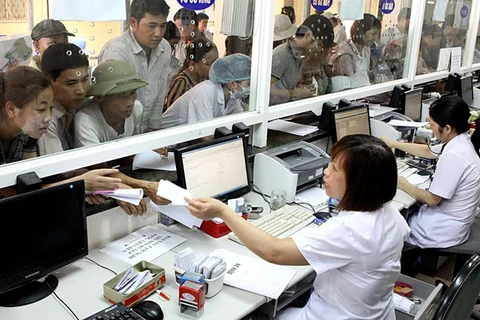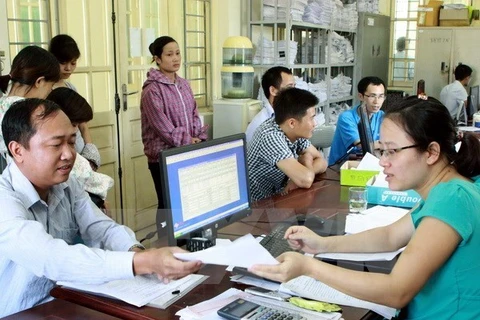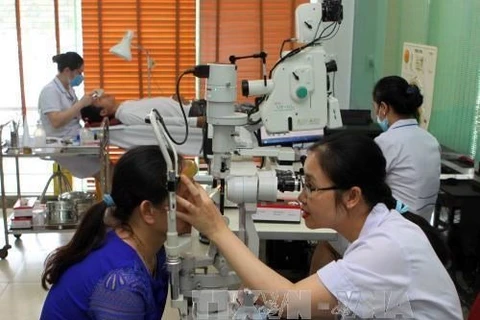HCM City (VNA) - The social insurance sector has made significant improvement in administrative procedures reform after four years implementing the Government Resolution 19/ NQ-CP on improving the business environment, delegates told a seminar in Ho Chi Minh City on September 28.
Dao Viet Anh, Deputy General Director of the Vietnam Social Security (VSS), said the administrative procedures were reduced by 75 percent from 114 in 2013 to 28 now.
That was thanks to the application of information technology as well as electronic transactions for both organisations and individuals in all areas involved in the sector, he said.
At present, the sector’s IT system has connected with over 12,000 medical facilities and performs electronic surveillance.
Nguyen Minh Thao from the Central Institute for Economic Management said since the implementation of Resolution 19, Vietnam’s business environment is constantly improving.
The World Economic Forum’s latest global competitiveness list, released on September 27, ranked Vietnam 55th overall, up five places from last year, she said.
The administrative reform, simplifying procedures and accelerating the application of electronic transactions have significantly helped businesses to reduce time and costs, she said.
Last year time needed for paying social insurance reduced by 89 hours to 189 hours a year.
The resolution 19 orders the reduction of time required for payment of social insurance to 49 hours a year, so more needed to be done to accomplish the target, delegates said.
Delegates at the workshop also suggested the Government to adjust the social insurance premium as it was too high compared to other countries, making its business environment less competitiveness.
The current social insurance premiums in Vietnam are the highest in ASEAN with 32.5 percent of the monthly salary, in which enterprises pay 22 percent and employees contribute 10.5 percent.
Meanwhile, in ASEAN, the social insurance premiums of Malaysia account for only 13 percent of salary, the social insurance premiums of the Philippines account for 10 percent of salary, Indonesia and Thailand with 8 percent and 5 percent respectively.
From 2018, workers and employees will have to pay social insurance based on total incomes, so the payment will increase.
The increase of social insurance premiums will increase the burden on businesses, increasing costs and affecting their competiveness, said Nguyen Thi Cuc, Chairwoman of the Vietnam Tax Consultants Association.
This will affect attracting foreign investors into the country, she said.
Thus she as well as many delegates at the event suggested the Government to reconsider the insurance premium rates.
At the event, officials from the VSS as well as social security officials from many provinces and cities untied issues faced by enterprises during the process of completing or paying social insurance online, among other issues.
Vu Quoc Tuan, deputy chief of the VSS’s secretariat, said 11.4 million people had compulsory social insurance by the end of September. The number of people with voluntary social insurance in the country totalled 243,000, Tuan said.
More than 79 million people in the country have health insurance, accounting for 84.9 percent of the total population, he added.-VNA
Dao Viet Anh, Deputy General Director of the Vietnam Social Security (VSS), said the administrative procedures were reduced by 75 percent from 114 in 2013 to 28 now.
That was thanks to the application of information technology as well as electronic transactions for both organisations and individuals in all areas involved in the sector, he said.
At present, the sector’s IT system has connected with over 12,000 medical facilities and performs electronic surveillance.
Nguyen Minh Thao from the Central Institute for Economic Management said since the implementation of Resolution 19, Vietnam’s business environment is constantly improving.
The World Economic Forum’s latest global competitiveness list, released on September 27, ranked Vietnam 55th overall, up five places from last year, she said.
The administrative reform, simplifying procedures and accelerating the application of electronic transactions have significantly helped businesses to reduce time and costs, she said.
Last year time needed for paying social insurance reduced by 89 hours to 189 hours a year.
The resolution 19 orders the reduction of time required for payment of social insurance to 49 hours a year, so more needed to be done to accomplish the target, delegates said.
Delegates at the workshop also suggested the Government to adjust the social insurance premium as it was too high compared to other countries, making its business environment less competitiveness.
The current social insurance premiums in Vietnam are the highest in ASEAN with 32.5 percent of the monthly salary, in which enterprises pay 22 percent and employees contribute 10.5 percent.
Meanwhile, in ASEAN, the social insurance premiums of Malaysia account for only 13 percent of salary, the social insurance premiums of the Philippines account for 10 percent of salary, Indonesia and Thailand with 8 percent and 5 percent respectively.
From 2018, workers and employees will have to pay social insurance based on total incomes, so the payment will increase.
The increase of social insurance premiums will increase the burden on businesses, increasing costs and affecting their competiveness, said Nguyen Thi Cuc, Chairwoman of the Vietnam Tax Consultants Association.
This will affect attracting foreign investors into the country, she said.
Thus she as well as many delegates at the event suggested the Government to reconsider the insurance premium rates.
At the event, officials from the VSS as well as social security officials from many provinces and cities untied issues faced by enterprises during the process of completing or paying social insurance online, among other issues.
Vu Quoc Tuan, deputy chief of the VSS’s secretariat, said 11.4 million people had compulsory social insurance by the end of September. The number of people with voluntary social insurance in the country totalled 243,000, Tuan said.
More than 79 million people in the country have health insurance, accounting for 84.9 percent of the total population, he added.-VNA
VNA
























